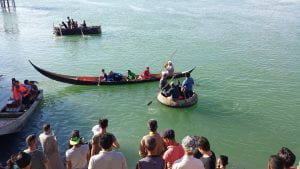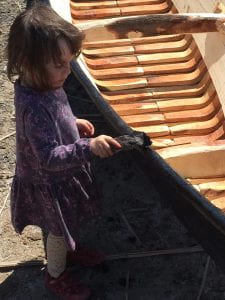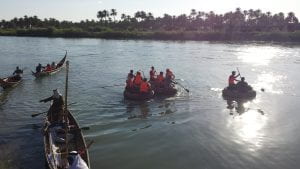Safina Projects on the revival of Iraqi watercraft heritage
By Hannah Lewis
I arrived in Iraq for the first time on 14th April this year.

1 Guffa coracle, Tarada canoe, and Delil barge guide-boat, on the Euphrates at Hit 12 April 2019 – copyright Rashad Salim
The visit felt overdue: it was almost two years ago, in June 2017, that I co-founded Safina Projects with my husband, the expeditionary artist Rashad Salim, and joined him on a mission to revive, protect and study the traditional boats and craft heritage of the Tigris and Euphrates rivers. My experience lies in project management and grant fundraising, so I took on the back office role –applying for funding, reporting to funders, admin and communications – while Rashad was in the field, tracking down the last few craftspeople who know how to build traditional boats like the Guffa coracle, Meshouf canoe and Isbiya barge.

2. Two Taradas and Chilaika on the Euphrates at Babylon 20 April 2019 – copyright Rashad Salim
These watercraft represent a heritage that has endured since earliest recorded history, but is now on the verge of extinction. Through a series of boat reconstruction workshops and oral history recordings – as part of our current projects, “Thesiger’s Tarada” supported by Nahrein Network (AHRC), and “An Ark for Iraq” supported by the Cultural Protection Fund (British Council with DCMS) – Safina Projects has documented these boats in detail, from the materials used to the making techniques, structure and traditional terminology associated with each boat type.
Through daily conversations with Rashad and through the thousands of photos and video recordings he has captured, I already felt familiar with the boats, their settings and the communities involved in their making. But seeing them at first hand would be very different, and I was excited to experience the real boats, the rivers and wetlands, and to meet the people Rashad had been working with for many months.

3. Hannah with Sajjad and Abu Muhenid paddling Nawfili at Chibayish 24 April 2019 – copyright Rashad Salim
My two week trip was a whistle-stop tour, checking in at Baghdad, Hilla, Basra, Huwair, Chibayish, Nassiriya, Samawa, and back to Baghdad. Many days were filled with meetings, updating partners on our project progress and planning the next stages. We’re collaborating with organisations including Humat Dijlah and Humat Furat (the Tigris and Euphrates Protectors, an environmental activist network), the Ministry of Culture, Ministry of Water Resources, and several universities and museums. Joint efforts include river expeditions, boat training events, and student projects featuring the documentation of boats using architectural drawing techniques (University of Basra, architectural department) and the transciption of oral history recordings for our planned digital archive and online museum (University of Thi-Qar, sociology department).

4. Leila helps tar the Nawfili – copyright Hannah Lewis
We’re working towards the culmination of the Nahrein-funded Thesiger’s Tarada project: bringing one of our reconstructions of Wilfred Thesiger’s iconic Tarada (Sheikh’s canoe) along with a Guffa coracle to participate in London’s Totally Thames festival this September. We’ll then hold a major exhibition at Basra Museum in October, when a second reconstructed Tarada will make its way from the boatyard at Huwair downriver to Basra, and be displayed in the Museum alongside photographs from Thesiger’s archive (provided by our partners at the Pitt Rivers Museum) and selected archaeological artefacts that offer clues to the development of the Tarada and its predecessors dating back to Sumerian times.
Progress in building partnerships was satisfying, but my favourite moments were those when I could forget about planning, step into one of the boats and be carried on the fast-flowing waters of the Euphrates at Babylon, or move into the deep quiet of the marshlands at Chibayish, where we stopped in a small Mudhif guesthouse on a reed island, and I practised paddling a Nawfili (a particular type of canoe named for the tribe who commissioned them, who preferred a more upright prow resembling those seen in Sumerian boat depictions). Observing some of the boat-making at first hand was a joy too, and even our 2-year-old daughter became totally absorbed in “helping” to tar the Nawfili, using a scrap of wood to push cooled tar into the gaps between the boards at the edge of the boat, while boatbuilder Abu Muhenid swiftly rolled hot taronto the larger surfaces.

5. Abu Muhenid tarring the Nawfili – copyright Rashad Salim
I also loved watching others using the boats, particularly during the training event we held at the Babylon archaeological site (19-21 April), when 28 young members of Humat Dijlah’s network who are keen to participate in our upcoming Euphrates Expeditions attended to practice the art of paddling Guffas and Meshoufs, as well as learning First Aid and oral history skills. The camaraderie of being part of a boat crew, the sheer enjoyment of being out on the water, and the shared pride in an ancient heritage that’s intimately connected with that environment, combined to make the experience very special for everyone involved.

6. Tarada, Meshoufs and Guffas at Babylon training event 20 April 2019 – copyright Rashad Salim
As our current projects draw to an end, the next challenge is how to sustain the boatbuilding practices that have been revived: how to forge some continuity for this heritage when the boats no longer serve their traditional functions, having been pushed out of existence by industrial substitutes (truck transport or motorboats), by damage to the environments in which they traditionally operated, and by the rupture of intergenerational knowledge transfer? There are no easy answers, but my experiences in Iraq demonstrated that traditional boats still have the power to bring people together and generate pride in post-conflict Iraq. They may no longer serve a central role in the economy, but in sectors like tourism, sports and leisure, culture and education, they bring a unique ingredient – perhaps a glimpse of how heritage can be engaged, not just as an effort to preserve the past, but as the foundation of a future that honours traditional knowledge, local ecology, and the vernacular heritage that has outlasted successive civilisations in Mesopotamia.
 Close
Close








